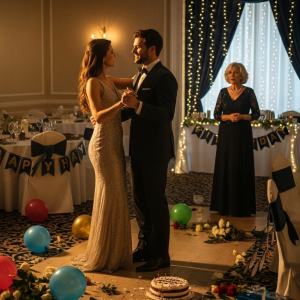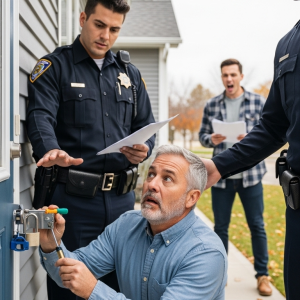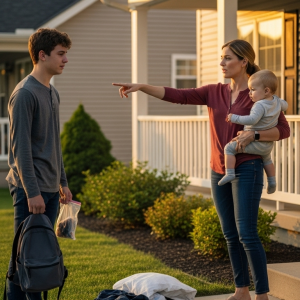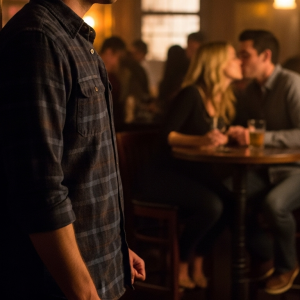Thanksgiving was always a strange holiday for me. For most of my life, I felt like the background character in my own family. Not hated, just… tolerated. My sister, Gina, was the golden child, my mother’s mini-me with perfect grades and a fiancé who ticked all the right boxes. I, on the other hand, was the quiet one, the artist, the one who, according to my Uncle Steve, had never really grown up.
Uncle Steve loved to say that. He was one of those guys who acts like a sitcom dad but without any of the charm—loud, opinionated, and with a deep love for grilling people over their life choices. And every year, without fail, he hosted Thanksgiving. Every year, I dragged myself there because, well, tradition, right?
But this year felt different. I hadn’t heard anything about dinner. No invitation, no family group text, not even a vague, guilt-tripping reminder from my mom. At first, I assumed they just figured I’d show up, like I always do.
That illusion shattered when I saw the photos on Gina’s Instagram. The long dining table was already perfectly set, the turkey carved and gleaming, and everyone was dressed up, laughing. It was a picture of holiday perfection, and it had clearly been taken before I was even supposed to be there.
A cold pit formed in my stomach. It wasn’t a mistake. The invitation wasn’t “lost in the mail.” This was deliberate. Still, a desperate part of me needed to see it for myself. I got in my car and drove the 20 minutes to my uncle’s house, telling myself that if it was all a misunderstanding, I’d laugh it off and take my seat.
The second I pulled into the driveway, the cold November air felt warmer than the scene waiting for me. Uncle Steve met me at the edge of the driveway, blocking the path. He didn’t even wait for me to get out of the car. He just walked up, his arms folded over his beer belly, and wore that little smirk he always had when he thought he’d won something.
“You weren’t invited, Ryan,” he said, his tone as casual as if he were discussing the weather. “Go home.”
I couldn’t speak. I just looked past him, through the large picture window of the house. I could see them all. My mom, raising a glass at the head of the table. My sister, laughing at something on her phone. And even my best friend, Kyle—someone I’d known since I was six, someone who usually spent the holiday bouncing between my place and his dad’s—was there, comfortably seated in the one place I thought I belonged.
None of them looked toward the window. They were just yards away, a perfect family portrait, completely oblivious to the one person left out in the cold.
I didn’t argue. I didn’t beg for an explanation. I just nodded once, a single, sharp movement. The betrayal was so complete it left no room for words. I got back in my car, drove to a nearby gas station parking lot, and leaned my forehead against the steering wheel, letting the silence swallow me whole.
Then, I made one phone call. It wasn’t to a lawyer or some secret agent of revenge. It was to a friend, Emily, who managed a popular social media page. That week, her page was running a feature called “Holiday Nightmares.”
“Em,” I said, my voice hoarse. “I think I’ve got a story for you.”
I told her everything, not with anger, but with the flat, hollow tone of truth. I didn’t use their names, just the roles they played: The Controlling Uncle, The Complicit Mother, The Golden Sister, The Traitorous Best Friend. She listened patiently.
“This fits the theme perfectly,” she said gently. “Are you okay with me posting it anonymously?”
“Go ahead,” I whispered.
Twenty minutes later, my phone began to buzz. First, it was a text from Kyle. Then a missed call from Gina. Then another from my mom. The post hadn’t just gotten a few comments; it had exploded. It had resonated with thousands of strangers who poured into the comments section with their own stories of being the family scapegoat, of feeling invisible at the holiday table.
The post was shared, then shared again. It hit Twitter. Suddenly, I wasn’t just Ryan, the odd one out. I was a symbol for every person who had ever been made to feel small by the people who were supposed to love them most.
And my family was finally seeing it. Not my pain, but their reflection in the horrified comments of thousands of strangers. That’s when the real calls began. My phone buzzed again. It was a number I didn’t recognize. I answered hesitantly.
“Hi… is this Ryan?” a woman’s voice asked, almost trembling. “This is Emily. On Steve’s daughter.”
I froze. Emily. My cousin. Uncle Steve’s daughter from his first marriage, the one he never, ever talked about. The one who had been erased from the family history years ago after a bitter falling out.
“I saw the post,” she said, her voice cracking. “I knew it was you. The way you wrote it… I just… I had to call. Ryan, you’re not crazy. You’re not the problem.”
We talked for hours. She told me about the years of my uncle’s controlling behavior, the way he pitted people against each other, the ultimatums and the threats. She told me how my mother had stood by and let it happen, always choosing the path of least resistance. It wasn’t just about this one dinner. It was a pattern, a sickness in the family I was only just beginning to understand.
For the first time in my life, I didn’t feel alone in my own family story.
The next morning, the doorbell rang. Not the buzzer for the building, but a sharp, insistent knocking directly on my apartment door. I looked through the peephole and my stomach dropped. It was my mother, and right behind her, his face a thundercloud, was Uncle Steve.
I took a deep breath and opened the door, but only as far as the security chain would allow.
“Ryan, sweetheart, let us in,” my mom said, her voice a strained whisper. “We need to talk.”
“We’re talking now,” I said, my voice steady.
Steve pushed forward. “Take that ridiculous post down,” he snarled. “You’re embarrassing the family.”
“You mean I’m embarrassing you,” I corrected him. “You weren’t worried about embarrassing me when you left me standing in your driveway.”
“This is not about you!” he shot back. “This is about airing our private business for the world to see! My business partners are calling me, asking questions!”
“Maybe they should,” I said, my voice turning to ice. “Maybe people should know who you really are when you’re not pretending to be the happy family man.”
My mother started to cry. “Ryan, please,” she sobbed. “Why would you do this? We raised you better than this.”
That was the line. The final thread. “No, you didn’t,” I said, the words sharp and clear. “You raised me to be quiet. You raised me to accept my place in the corner. You taught me that my feelings didn’t matter as long as everyone else was comfortable. That’s not raising someone. That’s controlling them.”
I looked from my mother’s tear-streaked face to my uncle’s furious one. And for the first time, I didn’t feel hurt or small. I felt nothing but a quiet, sad finality.
“I’m done,” I said. “We’re done.”
And with that, I closed the door, not slamming it, but shutting it with a soft click that echoed with the sound of a deadbolt sliding into place. On the other side, for a moment, there was stunned silence. Then the shouting started. But I didn’t listen. I walked away from the door, my phone buzzing with notifications I would no longer read, and for the first time in a very long time, I felt at peace.
That Thanksgiving, I ate leftovers alone on my couch. The next year, I hosted my own. Emily was there, and Kyle, who had spent months making a real, heartfelt apology. There were new friends, people who had become my chosen family. The laughter was real. The warmth was genuine. And no one was left standing on the outside, looking in.
The shouting outside my apartment didn’t last long. Uncle Steve’s voice thundered through the thin hallway walls, a mix of anger and wounded pride, but then it faded into muffled footsteps. A door slammed somewhere down the corridor. Silence returned.
I sat back against my couch, the weight of adrenaline still humming through my veins. My phone lay face-up on the coffee table, its screen lighting up with notifications every few seconds. I didn’t touch it.
I wanted quiet. I wanted stillness. But even in the silence, my family’s voices clung to me like smoke. You weren’t invited. Go home. Why would you do this? We raised you better than this.
No, I thought. You raised me to be small.
The next morning, Emily—the cousin who had called me—sent me a link. My story had been shared again, this time by a major online magazine that specialized in human-interest features.
The headline read:
“The Thanksgiving Table Has Empty Chairs: Stories of the Family Scapegoat.”
They quoted my words—the controlling uncle, the complicit mother, the golden sister. My pain was now in black and white for the world to read, and instead of shrinking from it, I felt… seen.
Comments poured in:
-
“This is my Christmas every year. I thought I was the only one.”
-
“Families can be toxic. Blood isn’t an excuse.”
-
“Ryan, if you’re reading this—you’re not alone. Come to my house next Thanksgiving, there’s always room for one more.”
I read until my eyes blurred. For the first time in my life, strangers treated me like I mattered.
By the third day, Gina finally called. Not a missed call this time, but a real one that I answered.
Her voice was shaky. “Ryan… what did you do?”
“What I had to,” I said evenly.
“You’ve destroyed Mom,” she snapped. “She’s crying every night. Uncle Steve’s furious. His business partners are threatening to pull out. Do you have any idea what kind of damage you’ve caused?”
“Yes,” I said. “For once, I do.”
“You don’t mean that.”
“I do.”
There was a pause. Then, more softly, she said, “You could’ve come to me. We could’ve worked this out as a family.”
I almost laughed. “Like the family worked me out of Thanksgiving? Like the family made sure there was no seat for me at the table?”
“Ryan—”
“No,” I interrupted. “The world knows now. And for once, I’m not the one left outside, looking in. You are.”
Her silence was heavy. Then she whispered, “You’ve changed.”
“Maybe I finally grew up,” I said. And I hung up.
That weekend, Emily invited me to coffee. We hadn’t seen each other since childhood, but when she walked into the café, it was like looking at a ghost of possibility—what my life might’ve been if I’d cut ties sooner.
She ordered tea, sat across from me, and leaned forward. “Ryan, I need you to understand something. You’re not the first.”
“The first what?”
“The first he erased.”
She told me everything. How Uncle Steve had cut her off when she was nineteen because she refused to follow his path into the family business. How he’d painted her as rebellious, unstable, ungrateful. How, over time, the family absorbed his version of the truth until she was nothing more than a shadow in the family album.
“That’s why I recognized your post,” she said. “The language, the tone… it was like hearing my own story echoed back.”
My chest ached. “So he’s been doing this for decades.”
She nodded. “Control is his currency. The dinner table is his throne. And anyone who threatens that gets erased.”
We sat in silence for a moment, stirring sugar into our cups. Then she smiled sadly. “But the thing about erasure is… we’re still here. We exist. And now, people are listening.”
For the first time, I didn’t feel like a background character. I felt like part of a hidden chapter, finally being written into the story.
The following week, I received a letter. Not an email. Not a text. A formal, lawyer-drafted letter threatening defamation charges if I didn’t “cease and desist slandering the Whitmore family reputation.”
I laughed when I read it. Grandpa always said lawyers were just expensive paper pushers.
I called Emily. “Should I be worried?”
She chuckled. “No judge is going to side with him. You didn’t use names. And even if you had—truth is a defense.”
Still, the letter proved one thing: Uncle Steve wasn’t afraid of losing me. He was afraid of losing control.
A week later, my mom came again. No Uncle Steve this time. Just her, standing outside my apartment with a small Tupperware container of pumpkin pie.
“Can I come in?” she asked softly.
I hesitated, then nodded.
She sat on the edge of my couch, wringing her hands. “I don’t know how to fix this,” she whispered.
“You can’t,” I said simply.
Her eyes brimmed with tears. “You’re still my son.”
“I know,” I said. “But you weren’t my mother that night.”
She flinched. “I thought if I said something, Steve would…” She trailed off, unable to finish.
“Would what?” I pressed.
“Cut me off. Cut all of us off.”
I shook my head. “So you sacrificed me instead.”
Her tears finally spilled. She reached for my hand, but I pulled back. “Mom, I don’t hate you. But I can’t keep being your sacrifice.”
She nodded slowly, painfully. “Then what do you need from me?”
I looked her straight in the eye. “I need you to choose me. Not Steve. Not Gina. Me. For once.”
Her breath caught, but she didn’t answer. That silence told me everything.
In December, I hosted a small dinner. Emily came. Kyle came, having spent weeks making amends. He admitted he’d gone to Thanksgiving because he felt pressured, guilty for saying no. He apologized, sincerely, and for the first time in months, I believed him.
We ate pasta instead of turkey. We laughed until midnight. There were no perfect Instagram photos, no golden children, no controlling uncles. Just us, a table built not by obligation but by choice.
For the first time, I felt like I belonged.
The next Thanksgiving, I woke early to the smell of roasting vegetables. My apartment was warm, alive with the chatter of friends carrying dishes up the stairs. Emily brought her partner. Kyle brought dessert. Even my neighbor from across the hall popped in with wine.
When the table was finally set—mismatched chairs, thrift-store plates, candles flickering—I looked around and felt a swell of something I hadn’t known in years.
Family. Not by blood, but by truth.
Halfway through the meal, my phone buzzed. A message from my mom. Just three words: I miss you.
I put the phone face down. Not because I didn’t care, but because this table—the one right here, right now—was mine.
I raised my glass. “To the ones who stayed,” I said.
“To the ones who stayed,” they echoed, clinking glasses.
And in that moment, I realized something. Uncle Steve could keep his throne, his table, his hollow empire of control. Gina could keep her curated perfection. My mother could keep her silence.
I had built something better.
Something real.
A year later, Emily and I launched a podcast. We called it “The Empty Chair.” Every week, we invited guests to tell their stories of exclusion, betrayal, and survival in family dynamics. Within months, it grew beyond anything we’d expected.
Emails poured in from people across the country. Stories of Christmas mornings where one sibling got everything and another got nothing. Weddings where family seats sat pointedly empty. Birthdays forgotten. Parents who played favorites like it was a sport.
And through it all, Emily and I repeated the same message: You are not the problem. You are not alone. You can build your own table.
When I looked back on that night in the driveway—the cold November air, Steve blocking me from the warmth of the house—I no longer felt rage. I felt gratitude.
Because sometimes, being shut out isn’t the end.
It’s the beginning.




